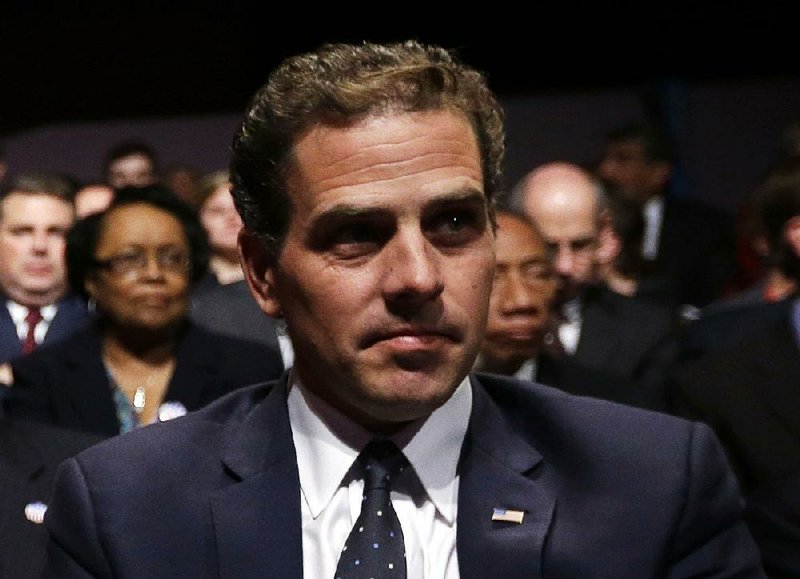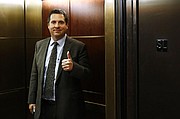WASHINGTON -- House Republicans asked for their own impeachment witnesses on Saturday, sending Intelligence Committee Chairman Adam Schiff, D-Calif., a list that includes former Vice President Joe Biden's son, Hunter, and the anonymous whistleblower who filed the initial complaint against President Donald Trump.
Also Saturday, Trump told reporters that he would release on Tuesday the transcript of an April call he made to congratulate Ukrainian President Volodymyr Zelenskiy after he won his election.
The impeachment inquiry moves from closed depositions to open hearings this week, which Democrats hope will present a strong case to the American public that bolsters support for impeaching the president.
Meanwhile, acting White House Chief of Staff Mick Mulvaney on Friday asked to join a federal lawsuit seeking a judicial ruling on whether Congress can compel Trump's senior advisers to testify in the impeachment inquiry.
Republicans and the president have complained that the Democrats' inquiry is unfairly partisan. Schiff is likely to reject many, if not all, of the witnesses from the Republicans' wish list. When the Democrats deny them, the Republicans likely will then present that as evidence of a one-sided process.
"We expect that you will call each of the witnesses listed above to ensure that the Democrats' 'impeachment inquiry' treats the President with fairness, as promised by Speaker [Nancy] Pelosi," wrote Rep. Devin Nunes, R-Calif., the ranking Republican on the Intelligence Committee. "Your failure to fulfill Minority witness requests shall constitute evidence of your denial of fundamental fairness and due process."
[Video not showing up above? Click here to watch » https://www.youtube.com/watch?v=nVNxT0V6vFw]
Witnesses who testified out of public view reportedly have corroborated the crux of the case against Trump -- that he pressured Zelenskiy in a July phone call to investigate his political rivals -- so the Democrats see no need for the whistleblower, who heard the story secondhand, to testify. Three career State Department officials are returning this week for the public hearings.
The release of a transcript of Trump's earlier call with Zelenskiy ahead of the inquiry's first public hearing seems unlikely to have a major impact, as witnesses have described that call as friendly and noncontroversial, according to testimony transcripts.
"We have another transcript coming up, which is very important," Trump said before boarding Air Force One to attend a college football game in Alabama. "They asked for it and I will gladly give it. There has never been a president who has been so transparent."
Republicans are seen as wanting to publicly question witnesses who would divert the conversation away from questions about Trump's behavior to allegations only tangentially related to the case, such as unfounded claims that Ukraine interfered in the 2016 election and that the Bidens acted nefariously in their dealings with Ukraine.
Schiff said in a statement that the committee would evaluate the Republicans' requests.
"This inquiry is not, and will not serve, however, as a vehicle to undertake the same sham investigations into the Bidens or 2016 that the President pressed Ukraine to conduct for his personal political benefit, or to facilitate the President's effort to threaten, intimidate, and retaliate against the whistleblower who courageously raised the initial alarm," Schiff said.
In addition to Hunter Biden, the Republicans said they also want to hear from Biden's business partner, Devon Archer, who served with Biden on the board of Burisma, a Ukrainian natural gas company.
Nunes writes that both Biden and Archer's time with Burisma "can assist the American public in understanding the nature and extent of Ukraine's pervasive corruption, information that bears directly on President Trump's long-standing and deeply-held skepticism of the country."
Biden's work for Burisma is a central issue in the impeachment inquiry into whether Trump abused his power by asking that Ukrainian leaders investigate the Bidens at the same time that he was withholding military aid from their country.
As vice president, Joe Biden pressured Ukraine to fire its top prosecutor, Viktor Shokin, because Biden and other Western officials said Shokin was not sufficiently pursuing corruption cases.
Previously, Burisma had been under investigation by Ukrainian prosecutors, but by 2016 when Biden was pushing for Shokin to be fired, the investigation into Burisma was dormant, according to former Ukrainian and U.S. officials.
Other individuals on the list are linked to conspiracy theories that go beyond Biden and the whistleblower. Two witnesses are related to Trump allies' unfounded allegation that Democrats were getting dirt on Trump from Ukraine during the 2016 election.
In relation to that, they've asked for Nellie Ohr, a researcher for Fusion GPS, which commissioned the Christopher Steele dossier linking Russia and Trump, as well as Alexandra Chalupa, a Ukrainian American who worked with the Democratic National Committee.
In addition, Nunes said Republicans also would like to call David Hale, undersecretary of state for political affairs, who Nunes said had experience dealing with U.S. foreign assistance programs.
The GOP requested that former National Security Council official Tim Morrison testify if Army Lt. Col. Alexander Vindman is called to testify. Vindman heard Trump's call with Ukraine's president.
Nunes requested that former U.S. special representative to Ukraine Kurt Volker testify on the same panel as two other witnesses: Ambassador William Taylor and deputy assistant secretary of state George Kent. Nunes also called on "all individuals" relied upon by the "anonymous whistle-blower" in drafting the complaint.
Nunes argued that Trump "should be afforded an opportunity to confront his accusers."
Democrats have pushed back on Republicans' desire to expose the identity of the whistleblower, citing protections afforded to federal employees who anonymously disclose information about government wrongdoing.
On Saturday, Trump tweeted that "Nervous Nancy Pelosi (who backed up Schiff's lie), Shifty Adam Schiff, Sleepy Joe Biden, the Whistleblower (who miraculously disappeared after I released the transcript of the call), the 2nd Whistleblower (who also disappeared), & the I.G., be part of the list" -- presumably referring to the witness list.
In denying the GOP witness list, Schiff will point to parameters he laid out last week limiting the scope of the public hearings to Trump's actions related to Ukraine.
If Schiff rejects any witnesses, the Republicans can appeal his decision to the full Intelligence Committee, where the Democratic majority is likely to back the chairman.
[Video not showing up above? Click here to watch » https://www.youtube.com/watch?v=2_YW_wZqMQw]
MULVANEY WANTS IN ON SUIT
Mulvaney, Trump's acting chief of staff, requested Friday to join a lawsuit filed late last month by Charles Kupperman, a former top national security aide to Trump, who said he faced conflicting orders from House Democrats and the White House over whether he must participate in the investigation and needed the court to tell him what his constitutional duty was.
Attorneys for Mulvaney said he was facing the same dilemma.
Democrats on the House Intelligence Committee subpoenaed Mulvaney last week and threatened to hold him in contempt if he refused to comply. In response, White House counsel Pat Cipollone instructed him not to testify, saying Mulvaney, who skipped his scheduled deposition Friday morning, was protected by "constitutional immunity" that extended to all of Trump's current and former senior advisers.
The questions raised in the case "go to the heart of our representative government and its promise to secure individual liberty by dividing the awesome power of government amongst itself," Mulvaney's attorneys, Christopher Muha and William Pittard, wrote in the filing.
"Mr. Mulvaney, like Mr. Kupperman, finds himself caught in that division, trapped between the commands of two of its co-equal branches -- with one of those branches threatening him with contempt," they wrote. "He turns to this Court for aid."
Mulvaney's request, if granted, would add further weight to a lawsuit that could have far-reaching effects on the House's inquiry into the president's efforts to pressure Ukraine into investigating his political rivals.
Democrats are keen to hear from Mulvaney, who has emerged as a central player in consequential decisions involving Ukraine. Mulvaney effectively admitted in a news conference last month that the administration withheld U.S. military aid to Ukraine to muscle the country's leaders into opening investigations that could help Trump politically. He later tried to walk back the remarks, but Democrats consider them to be a key piece of evidence in their impeachment case.
House investigators viewed Kupperman, who served as a deputy to former national security adviser John Bolton, as an important witness as well. Both he and Bolton had access to private deliberations at the White House involving the president's communications about Ukraine.
But on Wednesday, House lawyers said they had withdrawn Kupperman's subpoena to avoid a delay in the impeachment proceedings. They asked a federal judge to dismiss the case, saying they would instead look for guidance in the outcome of similar litigation involving a subpoena to former White House counsel Donald McGahn.
Responding to the dismissal request, an attorney representing Kupperman and Bolton, Charles Cooper, wrote in a letter to House lawyers that neither of the men would participate in the inquiry until a judge rules on whether they are legally permitted to testify. "It is important both to Dr. Kupperman and to Ambassador Bolton to get a definitive judgment from the Judicial Branch determining their Constitutional duty in the face of conflicting demands of the Legislative and Executive Branches," Cooper wrote in the letter, which was filed with the court Friday.
Like Kupperman, Mulvaney received a written directive from Cipollone saying the president was ordering him not to appear for his deposition in the House. Cipollone wrote that the Department of Justice's Office of Legal Counsel had determined that the president and his immediate advisers were "absolutely immune" from compelled congressional testimony -- a position the department has taken in previous administrations.
Mulvaney's attorneys said he should be included in Kupperman's lawsuit not just because the two men were facing almost identical competing demands, but because Mulvaney was still a member of the administration, unlike Kupperman, and therefore still a subordinate of Trump's.
"Mr. Mulvaney is both a closer and a more senior adviser to the President than was Mr. Kupperman," the filing read. "In short, there are reasons unique to Mr. Mulvaney's position that might form the basis of a judicial ruling against the House Defendants' threatened actions, reasons that Mr. Kupperman necessarily cannot advance."
The lawsuit names Trump and several top House Democrats, including Schiff, who is leading the inquiry.
A spokesman for the Intelligence Committee did not immediately respond to a request for comment.
Information for this article was contributed by Derek Hawkins and Colby Itkowitz of The Washington Post; and by Steve Geimann and Craig Torres of Bloomberg News.
A Section on 11/10/2019

